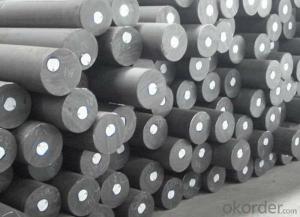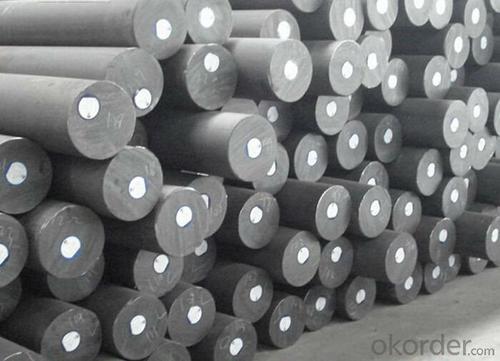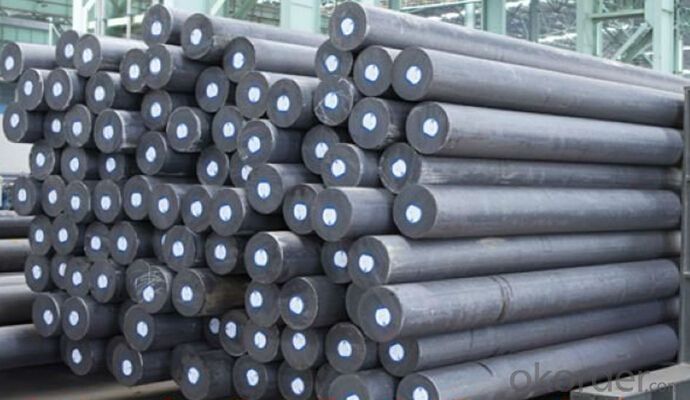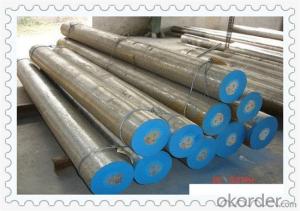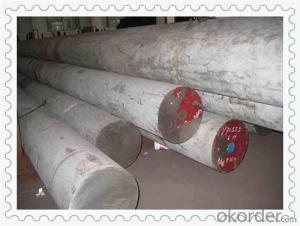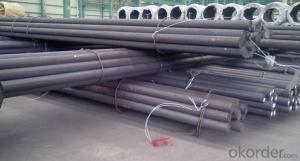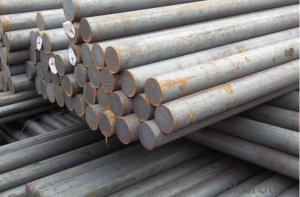Grade AISI 1060 CNBM Carbon Steel Round Bars C60
- Loading Port:
- Shanghai
- Payment Terms:
- TT OR LC
- Min Order Qty:
- 3 m.t.
- Supply Capability:
- 10000 m.t./month
OKorder Service Pledge
OKorder Financial Service
You Might Also Like
Specification
Specifications:
1.Diameter: 10mm - 1200mm
2.Length: Max 12m
4.Tech:EAF,LF,VD,ESR
5. Technique: Hot rolled
Description | Carbon Steel Rod/Carbon Steel Bar,carbon steel rod,carbon steel shaft,mild steel bar, Mild steel shaft,ms bar | |
Material | ASTM | 1005,1006,1008,1010,1015,1020,1025,1030,1035, |
DIN | Ck10,Ck15,Ck22,Ck25,Ck30,Ck35,Ck40,Ck45,Ck50, 30Mn4,40Mn4 | |
BS | 040A04,095M15,045M10,080A40,045M10,080M50 | |
Standard | GB/T799,ASTM A29,A108,A321,A575,BS970,DIN1652,JIS G4051 | |
Section shape | Round,square,hexagonal,flat,angle | |
Surface | Black painted,galvanized | |
Specifications | Round bar | Diameter: 10mm~1200mm |
Angle bar | Size: 3mm*20mm*20mm~12mm*800mm*800mm | |
Square bar | Size: 4mm*4mm~100mm*100mm | |
Flat bar | Thickness: 2mm~100mm | |
Width:10mm~500mm | ||
Hexagonal | Size: 4mm~800mm | |
Length | 2m,4m,5.8m,6m,11.8m,12m or as required. | |
Chemical Composition:
C | Si | Mn | P | S | Cr | Ni | Cu |
0.47~0.55 | 0.17~0.37 | 0.50~0.80 | ≤0.035 | ≤0.035 | ≤0.15 | ≤0.25 | ≤0.25 |
Usage and Applications:
Mold bottom
Plastic mold
Construction machinery parts
Automobile parts
Security grills
Screens
Construction
Packaging & Delivery:
Packaging Detail: Standard seaworthy packing or as customer required; all goods are packed in bundle with steel strips and shipped by break bulk vessel or container
Delivery Detail: 45 days
Production Flow:
EAF+LF+VD+ Forged+ Heat Treatment
Material prepare (billet) — heat up — rough rolling — precision rolling — cooling — packing — storage and transportation
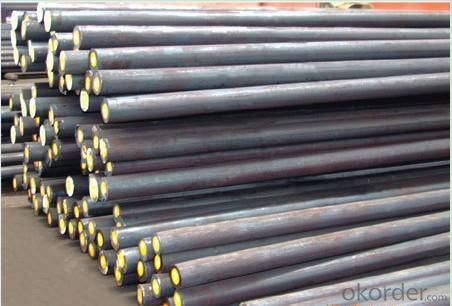
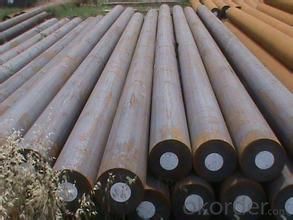
Quality Assurance:
1. We will strictly inspect our production that we sold according to the customer’s request.
2. Our steel reaches international quality standards.
3. Quality should be in conformity with the specification of the manufacturer. Quantity and packing conditions should be in conformity with the term in the contract.
4. Should the packing found damaged, the buyer has the right to claim to the seller
- Q: What are the different methods of surface peening for special steel?
- Some of the different methods of surface peening for special steel include shot peening, glass bead peening, and laser peening. Shot peening involves bombarding the surface of the steel with small spherical shots to create compressive stresses, which helps to increase the strength and durability of the material. Glass bead peening uses small glass beads instead of shots to achieve a similar effect. Laser peening, on the other hand, involves using high-energy laser pulses to generate shock waves on the surface of the steel, resulting in improved fatigue resistance and damage tolerance. Overall, these methods can enhance the performance and lifespan of special steel components.
- Q: How is high-temperature tool steel used in the production of hot work tools?
- High-temperature tool steel is used in the production of hot work tools due to its exceptional heat resistance and strength properties. It can withstand the high temperatures generated during hot work processes such as forging, extrusion, and die casting, without losing its hardness or experiencing deformation. This steel is used to manufacture tooling components like dies, punches, and inserts, ensuring their longevity and performance in extreme heat conditions.
- Q: How does special steel contribute to the aerospace industry?
- Special steel plays a crucial role in the aerospace industry by providing exceptional strength, high temperature resistance, corrosion resistance, and other mechanical properties necessary for aircraft components. It is used in the manufacturing of critical parts such as landing gear, engine components, structural frames, and fasteners, ensuring safe and reliable operation of aircraft. Additionally, special steel's lightweight nature enables improved fuel efficiency and allows for the design of more aerodynamic and efficient aircraft, ultimately contributing to the advancement and growth of the aerospace industry.
- Q: How does special steel contribute to energy efficiency?
- Special steel contributes to energy efficiency in several ways. Firstly, special steel alloys are often used in the manufacturing of energy-efficient appliances, such as refrigerators and air conditioners. These steel alloys have enhanced heat transfer properties, allowing for more efficient cooling and heating processes, thereby reducing energy consumption. Secondly, special steel is commonly used in the construction of energy-efficient buildings and infrastructure. Its high strength and durability enable the creation of lightweight and sustainable structures, which require less energy for heating, cooling, and maintenance. Moreover, special steel plays a crucial role in renewable energy technology. It is used in the production of wind turbines, solar panels, and hydroelectric power plants, enhancing their efficiency and overall performance. The unique properties of special steel, such as corrosion resistance and high tensile strength, make it ideal for withstanding harsh environmental conditions and maximizing energy generation. In summary, special steel contributes to energy efficiency by enabling the development of energy-efficient appliances, constructing sustainable buildings, and optimizing renewable energy technologies. Its utilization in various industries helps reduce energy consumption and promote a more sustainable future.
- Q: How is special steel used in the telecommunications supply chain?
- Special steel is used in the telecommunications supply chain for various applications. It is commonly used in the manufacture of transmission towers, antenna masts, and other infrastructure components. The high strength and durability of special steel make it ideal for supporting heavy equipment and withstanding harsh environmental conditions. Additionally, special steel is also utilized in the production of fiber optic cables, providing protection and strength to ensure efficient data transmission. Overall, special steel plays a crucial role in ensuring the reliability and performance of telecommunications networks.
- Q: How does special steel perform in high-stress corrosion cracking environments?
- Special steel is specifically designed to perform well in high-stress corrosion cracking environments. This type of steel is highly resistant to corrosion and can withstand the combination of stress and corrosive elements present in these environments. Its unique composition and manufacturing process make it more durable and less prone to cracking, ensuring its reliable performance in such challenging conditions.
- Q: Is special steel suitable for structural applications?
- Yes, special steel is suitable for structural applications. Its unique properties such as high strength, durability, and resistance to corrosion make it an ideal choice for constructing buildings, bridges, and other infrastructure where structural integrity is crucial. Special steel also offers excellent weldability and formability, allowing for versatile design possibilities in structural applications.
- Q: How does special steel contribute to the electrical conductivity of products?
- Special steel contributes to the electrical conductivity of products by offering high levels of purity and low levels of impurities. Its composition and manufacturing process ensure that it has excellent conductivity and minimal resistance, allowing for efficient flow of electric current.
- Q: What are the main properties of special steel?
- Special steel, also known as alloy steel, possesses several key properties that set it apart from regular steel. Firstly, it exhibits exceptional strength and hardness, making it highly resistant to wear, impact, and deformation. Additionally, special steel offers excellent corrosion resistance, ensuring durability and longevity in various environments. It also demonstrates superior heat resistance, allowing it to withstand high temperatures without losing its structural integrity. Lastly, special steel offers excellent machinability, enabling it to be easily shaped, fabricated, and processed into a wide range of components and structures.
- Q: How does special steel contribute to the manufacturing of springs for automotive applications?
- The unique properties and characteristics of special steel play a crucial role in the manufacturing of springs for automotive applications. Springs are essential components in automobiles as they provide suspension and shock absorption, which ensures a comfortable and smooth ride. One of the main advantages of using special steel in spring manufacturing is its high strength and durability. Springs are constantly subjected to stress and repetitive loading, but special steel can withstand these forces without deforming or breaking due to its exceptional strength. This property ensures that the springs can maintain their shape and performance over extended periods of use, guaranteeing reliable functionality. Special steel also offers excellent fatigue resistance, a vital characteristic for automotive springs. Fatigue occurs when a material weakens and eventually fails after repeated loading and unloading cycles. However, special steel is specifically designed to withstand fatigue, allowing the springs to endure constant pressure and stress without prematurely failing. Furthermore, special steel provides superior corrosion resistance, which is particularly important for automotive springs. Cars are exposed to various environmental elements, such as moisture, road salt, and chemicals, which can lead to corrosion and deterioration of the springs. By utilizing special steel with enhanced corrosion resistance, manufacturers can ensure that the springs have a longer lifespan and maintain their performance even in harsh conditions. Additionally, special steel offers versatility in terms of its composition and properties. Manufacturers can choose from a wide range of special steel alloys, each with its own unique characteristics, to meet specific requirements. This flexibility in material selection empowers manufacturers to design and produce springs that are tailored to the specific needs of automotive applications. Some alloys offer greater elasticity, allowing the springs to flex and absorb shocks more effectively, while others provide higher hardness, enhancing the springs' load-bearing capacity. In conclusion, special steel significantly contributes to the manufacturing of springs for automotive applications by providing high strength, durability, fatigue resistance, corrosion resistance, and versatility. These properties enable the production of reliable, long-lasting springs that ensure optimal suspension, shock absorption, and overall performance in vehicles.
Send your message to us
Grade AISI 1060 CNBM Carbon Steel Round Bars C60
- Loading Port:
- Shanghai
- Payment Terms:
- TT OR LC
- Min Order Qty:
- 3 m.t.
- Supply Capability:
- 10000 m.t./month
OKorder Service Pledge
OKorder Financial Service
Similar products
Hot products
Hot Searches
Related keywords
